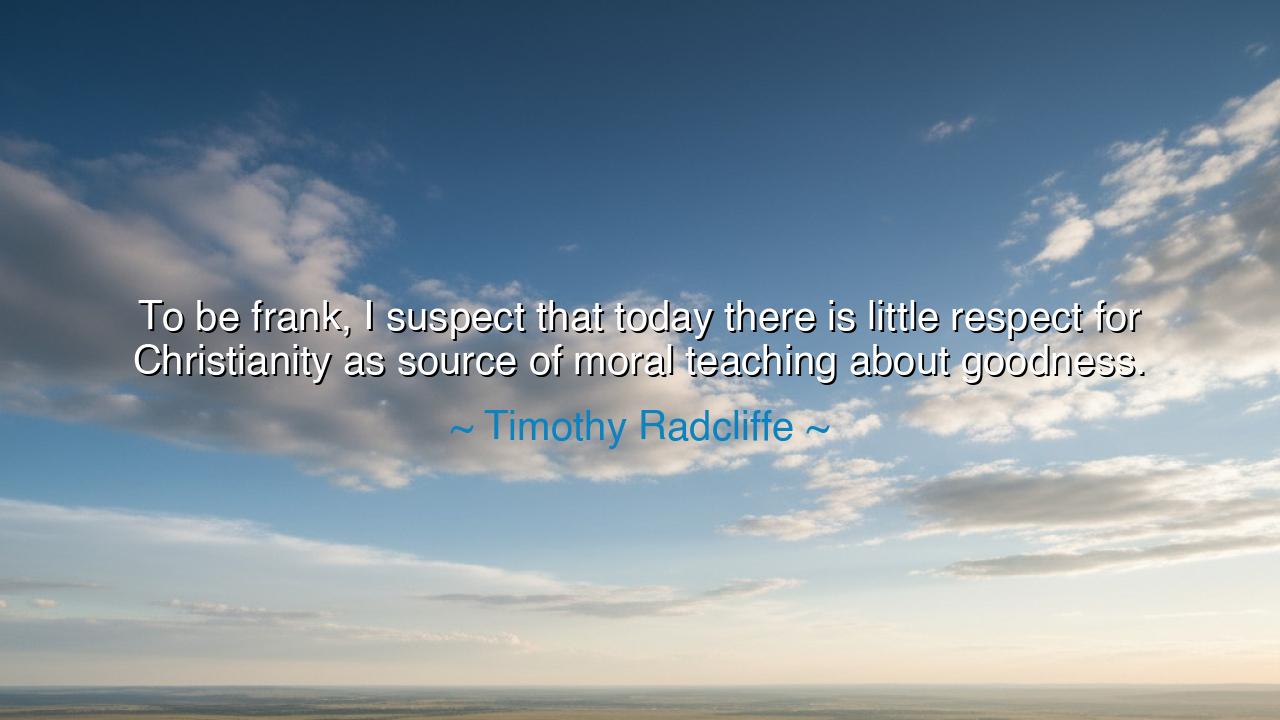
To be frank, I suspect that today there is little respect for
To be frank, I suspect that today there is little respect for Christianity as source of moral teaching about goodness.






Hearken, O seekers of wisdom, to the words of Timothy Radcliffe, who lamented: "To be frank, I suspect that today there is little respect for Christianity as source of moral teaching about goodness." In these words lies a mirror reflecting our age, where the guiding stars of moral virtue and ethical living seem dimmed beneath the clamor of fleeting pleasures and the pursuit of worldly gain. Once, in the temples of thought and in the quiet cloisters of the mind, Christianity stood as a beacon, not merely of faith, but of guidance, offering humanity a compass for the soul’s journey toward goodness. Yet now, in the cacophony of voices, the voice of conscience seems often drowned, and the ancient paths of ethical wisdom are trodden upon with indifference.
Long ago, when the Roman Empire stretched across the known world, the teachings of Christ were whispered in secret, carried in hearts like fragile candles against the darkness of moral chaos. Citizens, subjected to corruption and decadence, found in those teachings not only hope, but instruction: the humility of the poor, the courage to forgive, the strength to act justly. It was in this crucible that the seeds of Christian moral guidance bore fruit in acts of charity, in care for the sick, in the protection of the weak. Radcliffe’s lament reminds us that what was once revered as a source of goodness is now often dismissed, not because its truths are false, but because the world has turned its gaze elsewhere.
Consider the story of Dietrich Bonhoeffer, the German pastor and theologian who stood against tyranny in the dark days of the Third Reich. His life was a testament that moral courage and goodness are inseparable from faith, yet his teachings, deeply rooted in Christian thought, were viewed with suspicion by many in a world drifting toward expediency and self-preservation. Bonhoeffer knew that to ignore the voice of conscience, even under threat of death, was to betray the eternal principles of justice and mercy. He exemplified that the moral guidance of Christianity is not antiquated lore but a living flame, a call to action in the face of injustice.
Yet, Radcliffe’s observation is not mere nostalgia; it is a wakeful warning. The erosion of respect for Christianity as a moral compass signals a society that increasingly judges goodness by convenience rather than conviction. In this age, the acts of kindness, the mercy toward the downtrodden, the courage to speak truth against falsehood, are often measured by secular standards, stripped of their spiritual roots. The ancients knew that virtue without reverence is like a tree without roots: it may sway in the wind but cannot withstand the storms of life.
Let us look to history once more, to the medieval monasteries where monks preserved knowledge and practiced charity in equal measure. Here, the intertwining of faith and moral instruction created communities that endured famine, plague, and war. They understood that Christianity, far from being merely a private creed, was the wellspring from which goodness and ethical living flowed into the wider world. Today, when respect for such foundations wanes, we risk losing not only spiritual guidance but the communal bonds that sustain humanity in times of trial.
The lesson Radcliffe imparts is urgent and clear: the measure of goodness is not found in popularity, but in fidelity to principles that transcend transient opinion. The ancients remind us that wisdom must be both learned and lived; moral teaching must be embodied, not merely espoused. Christianity, like all great traditions of ethical thought, invites reflection, action, and courage. It teaches that forgiveness, justice, mercy, and humility are not abstract ideals, but daily practices that shape the character of the world.
Practical action, then, is our inheritance. Seek knowledge not only in the pages of books but in the lived example of the virtuous. Act with courage when wrongdoing presents itself; forgive when bitterness tempts; give when abundance is yours, and comfort when sorrow surrounds you. Let your life bear witness that the teachings of Christianity, though sometimes dismissed, still harbor the ancient flame of goodness, capable of illuminating even the darkest corridors of the human heart.
So, O seeker, remember this: the world may diminish respect for sacred teachings, yet goodness remains eternal. Let your choices, your compassion, and your courage testify that moral wisdom, though questioned, is never obsolete. In living these principles, you honor the legacy of Radcliffe, Bonhoeffer, and countless others who have shown that Christianity as a source of moral teaching endures, in the hearts of those brave enough to heed its call.
If you want, I can also condense this into a narrated-style version, with rhythmic rises and pauses, perfect for reading aloud like an ancient sermon. Do you want me to do that?






AAdministratorAdministrator
Welcome, honored guests. Please leave a comment, we will respond soon